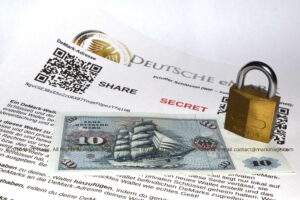The New Yorker, of all ‘specialist’ tech magazines out there, has an article on “How the NSA Cracked the Web”!
What a surprise.
For starters, as the web isn’t encrypted in the first place, it cannot be ‘cracked’. Further down into the article — and after some extensive sorting out all the mis-understandings of its obviously computer-illiterate author — the reader is finally let in on that ‘cracking success’ of the NSA: it turns out to be pretty lame and, in fact, limited mostly to compromising Microsoft’s and some other commercial software vendors’ master keys.
This got nothing to do with real decryption or with ‘cracking’ or any ‘code breaking’ whatsoever.
What’s noteworthy, though, is that it is admitted between the lines that all the “real” encryption technologies are as safe as always assumed (with e g 2048-bit keys still unbreakable). Therefore, applying these coupled with a few simple steps of protecting and securely hosting any content one might have out on the public internet continues to be the way to go.
At the end of the day, the so-called ‘spectacular success’ of the NSA does nothing more than illustrate why:
- Microsoft IIS (Internet Information Server software) is insecure (a fact widely known since 10+ years),
- Windows in particular (and to a lesser extent Apple OS X) contains government backdoors and is less secure than peer-reviewed Open Source operating systems,
- wLAN setups can never be fully secured (a fact known throughout the IT Security industry since wLANs exist and now re-enforced),
- mobile communications as well as wLAN technologies are never secure (nor healthy for the user, both facts are known but usually disputed by the industry in order to sell their stuff)
- common sense is still superior to “intelligence” (as in military etc)
- all industrial-strength and professional encryption and IT security measures are effective
From the last bullet point it is obvious that encryption tachnologies, in fact, are so effective the NSA and U. S. federal government have stupid media outlets publish their rubbish in order to “win back territory” by means of psychological warfare instead of embarking on the — next to impossible — journey of cracking Phil Zimmerman’s PGP encryption or any of the derivative technologies like GPG (GnuPG) or openPGP. (Read our upcoming separate article on how to obtain these open source tools, for FREE, and what basic measures to take in order to make illegal government surveillance as well as data theft as hard as possible.)




Talking about AI is a “trending topic” these days. That’s because anything-AI is currently hyped up and, as a result, sells like hot cake. With AI having been made the latest flavor of the day, it’s easy to churn out books on the subject too. Throw in a few claims of “how great” AI would be “for us”, and with that slightly different-sounding angle you have a fairly good shot at selling a good number of copies.
That does not mean that we can, let alone should, believe anything written in books like these when it comes to potential “benefits” of AI for all of us. Especially not as that claim is easily debunked by simple technical facts.
The overall consensus in Computer Science is that AI is an enslaving technology — whereas ENCRYPTION methods are tools for freedom and for protecting liberties. (Fact number one apparently neglected in this discussion.)
What’s more though is that AI does not even have any trace of “intelligence” in it (no matter what the mainstream calls it), but it is merely a (slightly) more complex way of connecting list entries, database tables, and networked/distributed information. So ultimately merely a “phoebook-lookup” type of “knowledge”, nothing particularly noteworthy actually.
And it gets worse when you know how this alleged AI is doing its “learning”: initially by interviewing mediocre contemporaries (who already are severely deficient in knowledge, reason, and even real-life skills) not as to FACT but as to THEIR OPINION about how something is, for instance, spelled or pronounced in their own language (let alone a foreign one!) with — unsurprisingly — dismal results. This is not science but merely poll-taking, and from an unsuitably selected base of participants at that.
We all know, or at least should still remember even in today’s day and age, that we cannot pop the question “What’s 2 + 2” to a handful of “diverse” groups and let the result be dictated by Trump supporters, the LGBT fringe group, BLM, the Better-Business Bureau or homeowners association, Amnesty International, labour unions, the National Trust in the UK, nor even a “trusted” school board, a Mensa chapter or Wikipedia volunteers. Any such attempt clearly is dumb and bound to fail. Yet, that’s exactly how the foundations of AI are built.
It is, therefore, fairly safe to say that AI can actually be discounted as a technology altogether, let alone be seen as “overall beneficial”. Anyone alleging this must be severely screwed. AI can be dangerous to our health (and wellbeing) though due to the simple fact that police authorities, governments, tyrants, and other forces in today’s public life are pouring (rather diverting or mis-allocating) large sums (of our tax money) into “policing” something that does not need to be (and legally even MUST NOT be!) policed that starkly — hence threatens our culture, our liberty, and everything that makes life worth living quite similar to the ex-Soviet secret police.
Steve Wozniak and Elon Musk have prominently warned of AI and are trying to halt any further AI research and development until and unless there are reliable rules in place that define what must not be regulated by AI — for precisely the above reasons.
So we’d all be well-advised to be really concerned, and certainly not believe the idiocies of AI being “beneficial”. Not even with AI itself actually isn’t functioning in the first place, better prepare for the worst. Powerful tools of preparation are readily available — more about that in a separate, more in-depth article on Privacy and crypto technologies as methods of re-gaining at least some of our freedom.